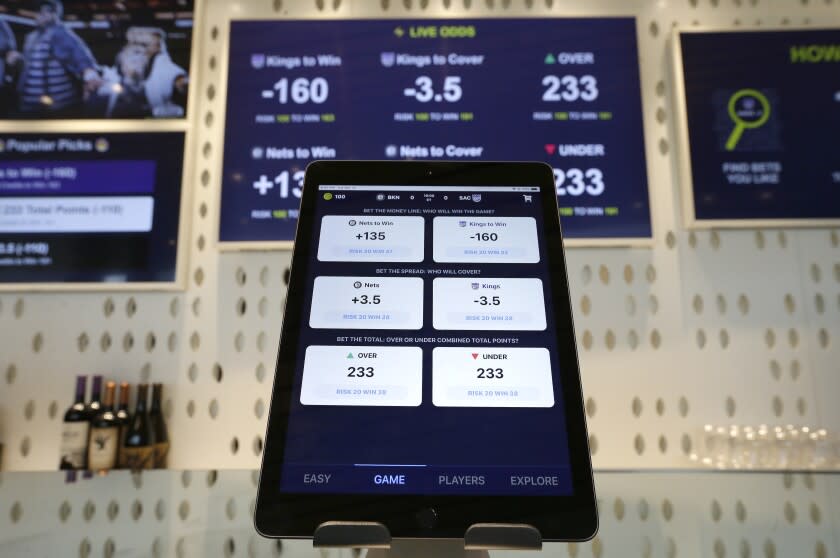Column: California's gambling propositions are breaking spending records. Do we really need more betting?

California is plagued by wildfires, drought, homelessness, unaffordable housing and the nation’s steepest gas prices. And there is scary inflation and devastating climate change.
So, what is our greatest concern? What keeps us awake at night? It should be all of the above.
But odds are it’s not the lack of gambling opportunities — specifically for wagering on professional sports.
Yet sports betting — whether online, in tribal casinos or remaining illegal — amounts to the highest-stakes fight among propositions on the November ballot in California.
At last count, an obscene $362 million has been raised to promote or oppose two initiatives to expand legal gambling in California — a gargantuan jackpot for political consultants, ad producers and TV stations. The total will probably reach a half-billion dollars by election day.
That’s the most money ever spent in a California proposition brawl. The previous record was $224 million on a 2020 referendum to repeal legislation that would have required Uber and Lyft to treat their drivers as employees rather than independent contractors. The companies far outspent the legislation’s union backers and won.
This year, Propositions 26 and 27 are being fought over by Native American tribes in California and out-of-state online gambling interests, including FanDuel and DraftKings. The winners’ pot is a multibillion-dollar stake in expanded legal wagering.
The attention-grabber is sports betting, now illegal in California but allowed in 33 other states.
The chief rationale for legalizing sports betting in California — although this isn’t the main campaign pitch — was expressed by state Sen. Bill Dodd (D-Napa) on Wednesday after co-chairing a legislative informational hearing on the two ballot initiatives.
“The hearing underscored that illegal sports wagering is happening now without regulation, safeguards or benefits to our state,” Dodd said. “This illegal activity should be taken out of the shadows, generating revenue to improve our state.”
He didn’t state a preference between the two propositions, which are vastly different.
Proposition 26 would allow sports wagering in person at tribal casinos and at four horse racing tracks: Santa Anita, Del Mar, Los Alamitos and Golden Gate.
There’d be a 10% state tax on sports-wagering profits at the tracks. The legislative analyst projects the state’s take would be “tens of millions of dollars annually.” Tribes have committed to paying the state 15% of their casino profits.
The measure also would permit roulette and craps at the casinos, games that are now illegal.
Bettors would need to be at least 21 under both propositions. And there’d be no betting on high school or college games.
Proposition 27 would legalize sports betting online when offered by an outfit partnered with a California tribe.
There’d be a 10% state tax on profits. The legislative analyst estimates that could bring in “possibly in the hundreds of millions of dollars but likely not more than $500 million annually.”
The proponents’ main pitch in TV ads is that 85% of the tax would go to homelessness programs. The remaining 15% would be shared with nonparticipating tribes.
To watch 27’s TV spots, you’d think the whole idea of the proposition was to solve homelessness.
“It’s a once-in-a-generation opportunity to generate a real, permanent funding source for homelessness without raising anyone’s income tax,” says Nathan Click, spokesman for the Proposition 27 campaign.
But let’s assume the tax produced the maximum amount for homelessness projected by the legislative analyst, $425 million. That’s still small compared with the $7.6 billion the state is spending this year. And $2.6 billion already has been appropriated for next year.
What’s needed more than money to address homelessness is a workable, politically viable plan.
The big worry for many tribes is that non-tribal interests will infiltrate their California gambling monopoly if Proposition 27 passes. Voters in 1998 gave tribes the exclusive right to operate casinos in California. The tribes believe it’s not sports betting the online operators are really seeking, but a pathway to also offer card games and very profitable slots.
“Proposition 27 breaks the promise that California voters made to California Indian nations over 20 years ago,” Sara Dutschke, chairwoman of the Ione Band of Miwok Indians, told the legislative committee Wednesday.
“The assault on our rights is not surprising. Historically, when we have the means to be self-reliant, it is taken from us. We lost our lands. With it, the riches of water, gold, agriculture.”
There’s another problem that affects all of us: When large-scale betting is brought into the home or workplace, it allows Dad to conveniently throw away a month’s rent or a state relief check betting on a Dodgers game. And why invite addiction by making it ultraconvenient to gamble?
There’s also a concern about kids setting up phony online accounts and getting hooked on gambling.
“This would turn every cellphone, laptop and every tablet into a gambling device,” says Jacob Mejia, the Pechanga Band of Indians vice president for public affairs. He’s spokesman for a Yes on 26, No on 27 coalition.
Click says that’s “fearmongering.”
But seriously, are Californians really in need of more gambling opportunities? There are 66 tribal casinos, 84 card rooms, 29 fairs with racetracks and 23,000 stores selling state lottery tickets. That’s plenty.
Proposition 27 is a bad bet for California. And Proposition 26 needs a closer look.
This story originally appeared in Los Angeles Times.

